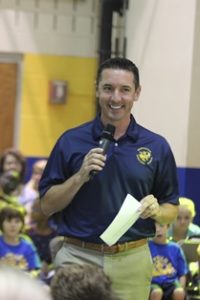 I thought my first blog would be an opportune time to share, My Why – why I choose to work with children, why access and equity are driving forces for me, and why, as an educational leader, my decisions are always student-centered.
I thought my first blog would be an opportune time to share, My Why – why I choose to work with children, why access and equity are driving forces for me, and why, as an educational leader, my decisions are always student-centered.
I am a native Philadelphian who grew up in a blue-collar neighborhood in the northeastern part of the city in the 1970s and 80s. I am the youngest of nine children and the first in my family to attend college. My parents’ priorities were to house, feed, and cloth us, and when possible, limit the inevitable sibling squabbles that erupted on a daily basis. Overall, education was considered an extravagance and not much of a priority in my family, especially higher education. Whenever college was brought up, my father would share his very practical thinking on the subject: Why would you pay money for four years in order to not make money for four years?
My family, and most of the people in the neighborhood in which I lived, were Irish or Italian and had very limited interactions and understanding of other races, ethnicities, and cultures. In this part of Philadelphia, grandparents lived down the street from their grandchildren, cousins were neighbors, and everyone knew everyone. In a positive way, the neighborhood as a whole looked out for each child. Childhood shenanigans were kept to a minimum and dinner was always just around the corner. But I learned soon enough that this insularity had its drawbacks too.
One of the most memorable moments of life is what I eventually learned about our neighborhood dry cleaner and my community. As a child, one of my chores was to take and pick up my parents’ clothes from the dry cleaner. The language used to refer to these business owners was, at that time, a common racial slur for people of Chinese origin. The ignorance of naming the only Asian-owned business in the neighborhood a derogatory term was only worsened by the fact that the owners weren’t even Chinese, they were Korean. When I realized in high school, yes, high school, that this word meant something other than the “dry cleaner,” I knew this was likely to be but just one example of a litany of demonstrated behaviors and attitudes showcasing the limited culture and understanding of the neighborhood and times in which I lived.
It was not until I finished my undergrad degree and moved to the DC area that I truly realized how poorly prepared I was to understand, appreciate, and respect others – all others. This is when I developed my purpose for educating. I wanted to ensure that the children I served would not experience the same ignorance that I had.
I believe if whole neighborhoods can adopt negative stereotypes, that we can, through education and communication, counter those stereotypes to create enlightened communities that value open-mindedness, diversity, and acceptance. My daily motivation, My Why, has been and remains ensuring that the students I serve have the opportunities, knowledge, and skills to not only demonstrate acceptance and understanding, but to lead others along that path.
Photos: At last year’s opening Chapel and my family on the first day of school.








